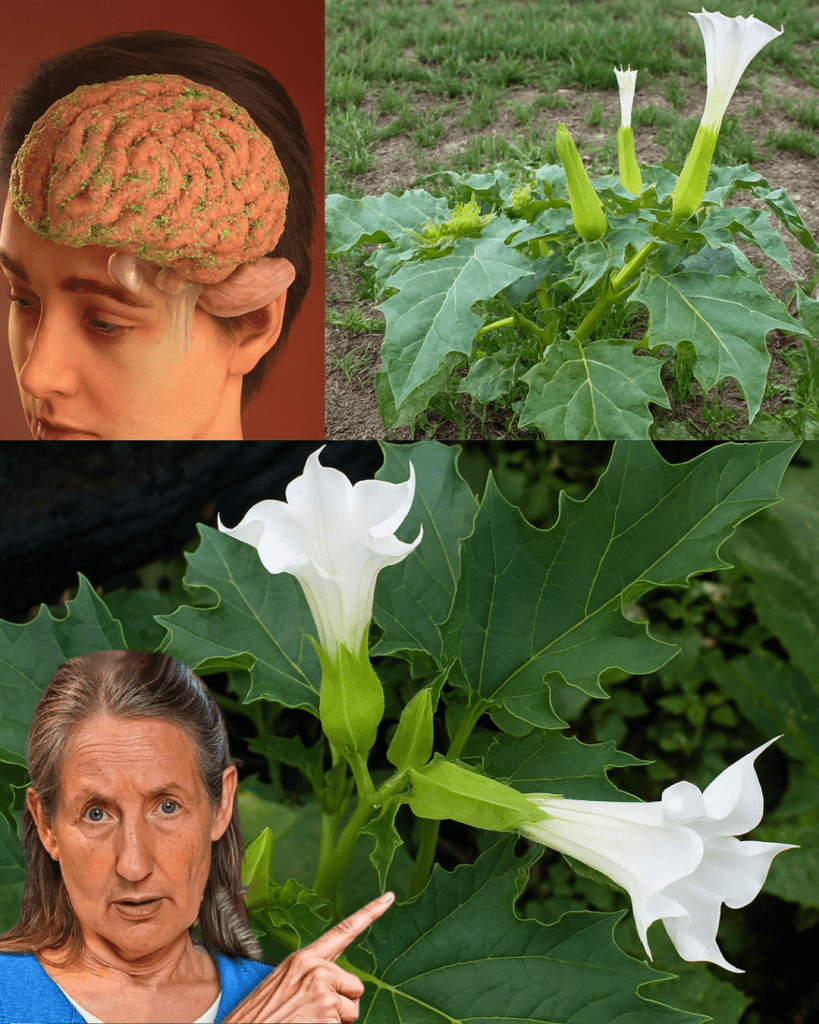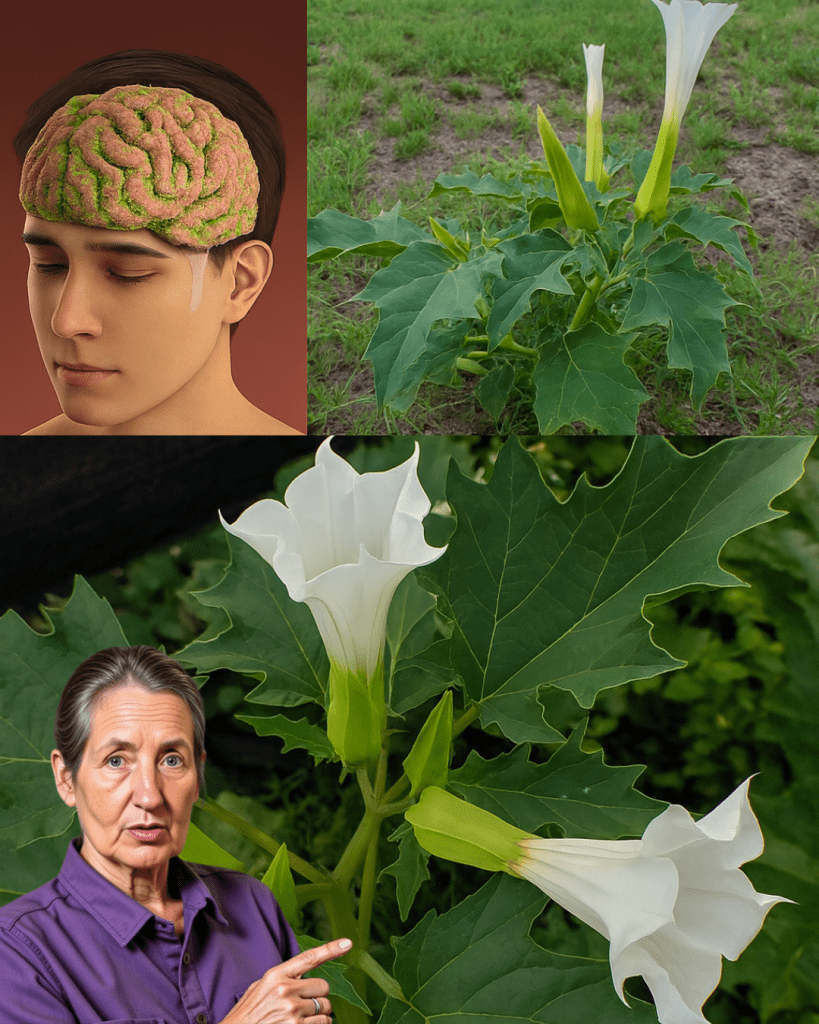What if a plant’s breathtaking beauty could lure you into a dangerous trap? The Datura genus, with its mesmerizing trumpet-shaped flowers and intriguing spiny seed pods, is a master of deception. Known as Devil’s Trumpet or Thorn Apple, these plants are as perilous as they are captivating, hiding a deadly secret within their leaves, seeds, and blooms. Native to the Americas but now widespread across the globe, Datura plants are notorious for their potent toxicity, posing severe risks to humans, pets, and livestock. Curious about why you should steer clear of this botanical menace? Dive into this eye-opening exploration of the Datura genus, its dangers, and essential safety tips to protect yourself and those you love. Prepare to uncover the chilling truth behind this toxic beauty!

What Is the Datura Genus?
🌿 A Deceptive Member of the Nightshade Family
The Datura genus belongs to the Solanaceae family, alongside tomatoes, potatoes, and other nightshades. Native to the Americas, these plants have spread worldwide, thriving in disturbed soils, along roadsides, and even in gardens where they’re sometimes mistaken for ornamental treasures. Characterized by large, trumpet-shaped flowers in shades of white, purple, or yellow, and spiky seed pods, every part of the Datura plant is laced with potent toxins. Their alluring appearance belies a dangerous reality, making awareness crucial for anyone who encounters them.
The Toxic Powerhouse: Tropane Alkaloids
⚠️ The Chemicals That Make Datura Deadly
The danger of Datura lies in its high concentration of tropane alkaloids—atropine, scopolamine, and hyoscyamine. These compounds disrupt the central nervous system, leading to severe, often life-threatening symptoms. Even minimal exposure through ingestion, inhalation, or skin contact can trigger a cascade of alarming effects, making Datura one of nature’s most hazardous plants. The unpredictability of alkaloid concentrations, which vary by plant, season, and growing conditions, heightens the risk, as even a small amount can be fatal.
10 Reasons to Keep Your Distance from Datura
1. Severe Hallucinations and Delirium
🧠 A Terrifying Trip You Can’t Control
Datura is infamous for inducing vivid, often frightening hallucinations and delirium. Unlike recreational substances, these hallucinations are disorienting and can last for days, leaving users in a state of confusion and fear. This makes Datura particularly dangerous for those seeking its psychoactive effects, as the experience is far from euphoric and can lead to severe psychological distress.
2. Life-Threatening Physical Symptoms
🚨 A Cascade of Dangerous Effects
Ingesting Datura can cause a range of physical symptoms, including dilated pupils, blurred vision, dry mouth, difficulty swallowing, and an elevated heart rate. In severe cases, these can escalate to seizures, respiratory failure, or coma. The rapid onset of symptoms—sometimes within minutes—makes Datura poisoning a medical emergency requiring immediate attention.
3. Unpredictable Toxicity Levels
🎲 No Safe Dose Exists
One of the most alarming aspects of Datura is its unpredictable toxicity. The concentration of tropane alkaloids varies widely between plants, seasons, and even individual parts like seeds or leaves. This means even a tiny amount, such as a single seed, can trigger severe poisoning, making accidental exposure a significant risk.
4. Danger to Children
👶 A Tempting but Lethal Curiosity
The colorful flowers and spiky seed pods of Datura can attract curious children, who may touch or ingest them unknowingly. Due to their lower body weight, children are especially vulnerable to the plant’s toxic effects, which can be fatal even in small doses. Parents must be vigilant in areas where Datura grows wild or is cultivated.
5. Toxic to Pets and Livestock
🐾 A Threat to Your Furry Friends
Datura poses a deadly risk to dogs, cats, horses, and livestock. Animals may be drawn to the plant’s foliage or seeds, and ingestion can lead to tremors, paralysis, or death. Pet owners and farmers must identify and remove Datura from their surroundings to protect their animals.
6. Risk of Accidental Poisoning
🍵 A Hidden Danger in Food and Tea
Cases of Datura poisoning have occurred from accidental consumption, such as mistaking its leaves for edible greens or brewing tea from its parts. In one tragic incident, a family was poisoned after eating a meal contaminated with Datura flowers. Such incidents highlight the need for caution when foraging or using unfamiliar plants.
7. Skin Contact Can Be Harmful
🖐️ Toxins Absorbed Through Touch
Handling Datura without protection can lead to poisoning, as its alkaloids can be absorbed through the skin, especially via mucous membranes or cuts. Gardeners and outdoor enthusiasts should wear gloves and avoid contact to prevent symptoms like skin irritation or systemic toxicity.
8. Misuse in Traditional Medicine
🌱 A Risk Finely Balanced with Benefit
While Datura has been used in traditional medicine, such as in Ayurveda for treating asthma or pain, its misuse can be catastrophic. Without expert guidance, the line between therapeutic and toxic doses is razor-thin, making it a dangerous choice for self-medication. Always consult a professional before using Datura for medicinal purposes.
9. Environmental Spread and Invasiveness
🌍 A Growing Threat in the Wild
Datura plants are highly adaptable, spreading easily in disturbed soils and becoming invasive in many regions. Their seeds can remain viable for years, germinating when conditions are right, which increases the likelihood of accidental encounters. This widespread presence makes public awareness critical.
10. Mistaken Identity with Safer Plants
🌸 A Deadly Lookalike
Datura species, particularly Datura inoxia (Moonflower), are often confused with harmless plants like the Moonflower vine. This misidentification has led to accidental poisonings, as people may unknowingly handle or consume Datura thinking it’s safe. Learning to identify its distinctive features is essential for safety.

Safety Tips to Protect Yourself and Others
🛡️ Stay Safe Around Datura
To avoid the dangers of Datura, follow these essential precautions:
- Avoid Contact: Do not touch or handle Datura plants, as toxins can be absorbed through the skin.
- Protect Children and Pets: Keep Datura out of reach, as its vibrant flowers and pods can attract curiosity.
- Wear Protective Gear: If removal is necessary, use gloves, long sleeves, and eye protection to minimize exposure.
- Educate Your Community: Share knowledge about Datura’s risks to prevent accidental poisonings.
- Opt for Safer Alternatives: Choose non-toxic plants like hibiscus or Brugmansia for ornamental gardening.
- Seek Immediate Help: If you suspect Datura poisoning, call emergency services immediately. Symptoms require urgent medical intervention, often involving supportive care or antidotes like physostigmine.
Why Awareness Matters
💡 Knowledge Is Your Best Defense
The Datura genus is a stark reminder that beauty in nature can conceal serious danger. Its striking flowers and historical use in rituals and medicine may intrigue, but the risks of poisoning far outweigh any allure. By understanding its toxic nature and spreading awareness, you can protect yourself, your loved ones, and your community from this deadly plant.
Take Action: Stay Safe and Spread the Word
🌟 Embrace Safety, Reject Risk
Encountered Datura in your garden or the wild? Leave it untouched and warn others about its dangers. For gardeners, consider safer alternatives that offer similar beauty without the risks. If you need guidance on identifying or safely removing Datura, consult local horticultural experts or authorities.
Ready to learn more about keeping your environment safe from toxic plants? Share this article with friends and family to raise awareness and keep safety first. Let’s work together to ensure the Datura genus remains a distant, untouchable beauty!
Disclaimer: This article is for informational purposes only and is not a substitute for professional medical advice. If you suspect Datura poisoning, seek emergency medical help immediately.









